Global Issues
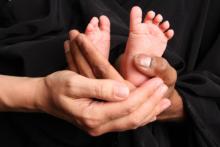
Nearly three in five births to unmarried women across the United States were to women living with their partner — marking the first time a majority of these births were to women in cohabiting relationships, according to a new analysis of federal data released Wednesday.
The increase was sharp; the percentage of nonmarital births within cohabiting relationships rose to 58 percent from 41 percent in just a few years, says the report, based on various data sources from the National Center for Health Statistics, collected between 2002 and 2013, the most recent available.
“What’s happened is the percent of nonmarital births within cohabiting unions has been increasing, but now it’s increased to the point where the majority of nonmarital births are to women that are cohabiting,” said Sally Curtin, the report’s co-author.
While the births in cohabiting relationships increased, the number, rate, and percentage of births to unmarried women overall declined during the same period.
In 2013, the total of 1,605,643 births to unmarried women was the lowest since 2005. The birthrate for unmarried women has steadily declined.

That a “universally beloved” entertainer such as Robin Williams could commit suicide “speaks to the power of psychiatric illness,” mental health experts say.
Williams, who died Monday at age 63, had some of the risk factors for suicide: He was known to have bipolar disorder, depression, and drug abuse problems, said Julie Cerel, a psychologist and board chair of the American Association of Suicidology.
People who are severely depressed can’t see past their failures, even if they’ve been as successful as Williams.
“With depression, people just forget,” said Cerel, who is also an associate professor at the University of Kentucky. “They get so consumed by the depression and by the feelings of not being worthy that they forget all the wonderful things in their lives.”
They feel like a burden on their family and that the world would be better off without them.
“Having depression and being in a suicidal state twists reality. It doesn’t matter if someone has a wife or is well-loved,” Cerel said.
Williams was certainly beloved, as shown by the outpouring of grief and sympathy on social media outlets Tuesday night.
A small plane carrying Nancy Writebol, the second American Ebola patient from Liberia, arrived in the United States on Tuesday, making a brief refueling stop in Bangor, Maine, en route to Atlanta and Emory University Hospital.
The same plane, a Gulfstream jet specially outfitted with an isolation pod, brought the first American patient, 33-year-old physician Kent Brantly, to the medical center from Liberia on Saturday, WLBZ-TV reports. The plane was on the ground in Bangor for less than an hour.
Brantly, with Samaritan’s Purse, and Writebol, with Service in Mission, are medical missionaries who were infected with Ebola while working with patients in Liberia.
SIM USA said on Monday that the 59-year-old Writebol was in serious condition.
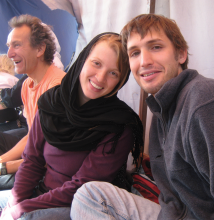
Bio: Kelly and Peter Shenk Koontz spent the last three years serving in Kabul, Afghanistan, through a Mennonite Central Committee partner.
Website: MCC.org
1. What work were you doing in Afghanistan?
We worked with a Mennonite Central Committee (MCC) partner in Kabul as Peacebuilding Project Managers. Our job was to integrate peacebuilding within different sectors of the partner organization, including adult education, community development, and many others. Day-to-day, this primarily meant developing curriculum and planning and conducting trainings for a variety of contexts—including rural community development teams and university students in Kabul.

I'M DREAMING. Ten young men about my son’s age are singing me a Mother’s Day greeting to the tune of “Happy Birthday.” I recognize the melody, of course, but the language is foreign. Still, I’m delighted; I clap and laugh.
Oh, wait. It’s Mother’s Day 2014 and I’m not dreaming. In a refugee camp in Jordan, 10 young Syrian men are singing beautiful Arabic words to me and two other visiting American moms. It’s our last stop in an intense week of refugee visits; it feels good to be laughing.
The singing men, and the young Syrian women who joined us as we toured an educational compound in the Za’atari U.N. refugee camp, were bright university students in Syria before the war—future historians, mathematicians, teachers, agricultural engineers; some just months from graduating—when the violence of Syria’s civil war forced them to flee.
“But when you end up in a refugee camp,” one of the young men explained, “people treat you like idiots. Like you understand nothing.” Herein lies one of the great refugee tragedies. Living at the mercy of others and with little respect, no decision-making freedom, and no control over their future often fuels anger and hopelessness in young refugees.
THE DEEPENING CRISIS gripping Iraq is a clear and present danger to global security. The crisis is fundamentally political in nature, however, not military. It cannot be resolved through the use of force, least of all by external military action from the United States. In the past, U.S. intervention has been the problem in Iraq, not the solution. Indeed many of Iraq’s current problems can be traced to the consequences of the U.S. invasion and occupation.
The United States now has a responsibility to help the Iraqi people, having contributed so much to their current travails, but our involvement should be diplomatic and humanitarian, not military. We should work through the United Nations to exert pressure on the violent extremists who are threatening the region and to mobilize international support for political and diplomatic solutions to the conflicts.
A major center of concern today is the extremist group called the Islamic State of Iraq and Syria, now identifying as the Islamic State. This group led the military takeover of Mosul and other Iraqi cities. It is a direct offshoot of the al Qaeda forces that emerged during the armed resistance to the U.S. invasion, but is now a rival to, and even more extreme than, al Qaeda.
Prior to 2003, al Qaeda did not exist in Iraq. It was only after the U.S. invasion, which shattered the state and sparked widespread violence and insurgency, that Islamist extremist groups were able to gain a foothold in Iraq. American actions fostered staggering levels of corruption and exacerbated growing Sunni-Shia sectarian tensions.

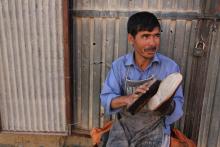
Last week, here in Kabul, the Afghan Peace Volunteers welcomed activist Carmen Trotta, from New York, who has lived in close community with impoverished people in his city for the past 25 years, serving meals, sharing housing, and offering hospitality to the best of his ability. Put simply and in its own words, his community, founded by Dorothy Day, exists to practice “the works of mercy” and to “end the works of war.” We wanted to hear Carmen’s first impressions of traveling the streets of Kabul on his way from the airport to the working class neighborhood where he’ll be staying as the APVs’ welcome guest.
He said it was the first time he’d seen the streets of any city so crowded with people who have no work.
Carmen had noticed men sitting in wheelbarrows, on curb sides, and along sidewalks, unemployed, some of them waiting for a day labor opportunity that might or might not come. Dr. Hakim, the APV’s mentor, quoted Carmen the relevant statistics: the CIA World Fact Book uses research from 2008 to put Afghanistan’s unemployment rate at 35 percent — just under the figure of 36 percent of Afghans living beneath the poverty level. That’s the CIA’s unemployment figure. Catherine James, writing in The Asian Review this past March, noted that “the Afghan Chamber of Commerce puts it at 40%, the World Bank measures it at 56% and Afghanistan’s labor leaders put it at a shocking 86%.”

Pope Francis met Meriam Ibrahim, the Christian woman spared a death sentence for apostasy in Sudan, at the Vatican on Thursday after she was flown to Rome by the Italian government following a vigorous international campaign to free her.
Ibrahim, 27, was accompanied by her husband Daniel Wani and two young children when she met Francis for nearly half an hour at his Santa Marta residence.
The audience was arranged only hours after she disembarked at Rome’s Ciampino Airport with her family on an official Italian aircraft. She was smiling as she carried baby Maya, who was born just two months ago as Ibrahim was shackled in prison.
The pope thanked her for her courage and loyalty to her Christian faith despite facing threats of execution in an ordeal that lasted nearly a year.
The Vatican’s chief spokesman, the Rev. Federico Lombardi, said Francis wanted Thursday’s meeting to be a “gesture of support for all those who suffer for their faith, or living in situations of difficulty or restraint.”

An Ebola outbreak that has killed more than 670 people in Africa is now taking a toll on doctors and health care workers battling the deadly disease, including two Americans.
Kent Brantly, 33, an American doctor who has been working in Liberia since October for the North Carolina-based aid organization Samaritan’s Purse, is receiving intensive medical treatment after he was infected with Ebola, according to a spokeswoman for the group.
Melissa Strickland said Brantly, who is married and has two children, was talking with his doctors and working on his computer while being treated.
A second U.S. citizen, Nancy Writebol, also has tested positive for Ebola, Samaritan’s Purse said. Writebol is employed by mission group SIM in Liberia and was helping a joint SIM/Samaritan’s Purse team treating Ebola patients in Monrovia. Writebol is married with two children, the organization said.
“Both of them tonight are in stable condition,” Ken Isaacs, Samaritan Purse’s vice president of programs and government relations, said Sunday. “But they are not out of the woods yet.”

Pope Francis has provoked a debate within the Catholic Church after being quoted as saying that one in 50 Catholic clerics is a pedophile.
In the latest example of his get-tough stance against sex abuse — and his signature style of frank answers to tough questions — the pope told the Italian daily La Repubblica that the sexual abuse of children was like “leprosy” in the church and he pledged to “confront it with the severity it requires.”
But the exclusive interview with 90-year-old veteran journalist Eugenio Scalfari published Sunday drew an immediate reaction from the Vatican that disputed the accuracy of the pontiff’s quotes.
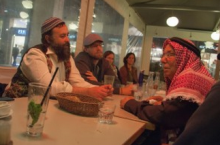
I was sitting in the airport the other day listening to yet another account of the current events unfolding in Israel and Palestine. Almost mechanically, the lips of the news anchor spilled out words like terrorists, extremist, escalating violence, detention, kidnapping, hatred, protest, etc. It was as though they were telling a story of some otherworldly reality that had virtually no human implications. It was all the stuff we are supposed to hear about the Middle East, so it successfully affirmed stereotypes, assumptions and prejudice.

Profits plunged by more than $100 million at the Vatican bank last year after thousands of accounts were shut down in a radical overhaul of the scandal-scarred institution.
In its 2013 annual report released Tuesday, the bank, officially known as the Institute for Religious Works, said its net profit totaled 2.9 million euros ($3.9 million) last year, a dramatic drop from the 86.6 million euros ($117.8 million) it reported in 2012.
The bank said the slump was due to extraordinary expenses, losses related to externally managed investment funds and fluctuations in the price of gold.
Losses included a controversial $20.5 million loan granted to a production company owned by a friend of Cardinal Tarcisio Bertone, the former Vatican secretary of state who has faced criticism for mismanagement as the church’s No. 2 official under retired Pope Benedict XVI.

The ground on our mountain is rocky ground and the land seems to have more stones on it than soil. I think it is a miracle that things grow here, that things grow so well here. But they do. We are planting, as all farmers do, in the hope that good rains will come and help the seeds grow into whole, full stalks of millet. I am enjoying learning the life of a Malinke farmer. Bala is my teacher. This is his field.

Through my work with The Global Immersion Project, I have spent a significant amount of time over the years cultivating relationships among both Israelis and Palestinians as we partner together in cultivating a narrative of reconciliation. As is often the case when we approach a people or place with the hopes of being/bringing the needed change, I have been the one most changed by my friends and colleagues who reside in the Middle East. Behind so many of the subconscious stereotypes and prejudices I had acquired earlier in my life I began to experience the richness of friendship and brotherhood among people I had previously “known” only through the latest sound bite.
Something I have learned in the classroom of real life relationships with Jews, Christians, and Muslims in the Holy Land is that our theology in the West has direct implications for the everyday lives of those in the Middle East. Often ignoring the remarkable movements of peacemaking, reconciliation, and collaboration that are sprouting like mustard seeds of hope across the Holy Land, we often choose only to amplify of the violence, discord, and disintegration of the region.

The King’s College, a Christian liberal arts school in New York City, announced on Friday that it has entered into an agreement with Coin.co, making it the first accredited college in the United States to accept Bitcoin for tuition, other expenses, and donations.
The college’s president, Gregory Alan Thornbury, said in a statement, “Allowing Bitcoin to be used to pay for a King’s education decreases our costs while simultaneously allowing our students to be a part of this exciting new technology.”
Coin.co, unlike most credit card companies, does not charge a transaction fee, so using the emerging payment technology could be a money saver. The college’s website lists a cost of $15,950 for 12-18 credit hours.
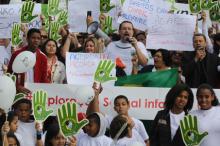
As Brazil counts down to the opening of the World Cup on June 12, churches in cities hosting the international soccer tournament are not content to sit on the sidelines and cheer.
They’ve launched a nationwide campaign to raise awareness of the hundreds of vulnerable children at risk of sexual exploitation during the month-long competition.
With an estimated 600,000 soccer fans expected to arrive in Brazil within a matter of days, the South American nation is under pressure to combat its international reputation as a destination for child sex tourism.
Church leaders fear the heavy flow of tourists during the games could fuel an explosion of sexual trafficking of children and teens at fan fest locations around the World Cup arenas.

Americans are showing more tolerance for a range of behaviors, with sex between unmarried adults, medical research on stem cells from human embryos, and doctor-assisted suicide all showing record highs and increases in “moral acceptability” from last year .
The Gallup poll’s annual “moral acceptability” scale has been conducted since 2001 and charts shifting cultural attitudes on a number of hot-button social issues. In the 2014 list released Friday, Gallup researchers said 12 of the 19 categories reflected “levels of moral acceptance that are as high or higher than in the past.”
“Americans largely agree about the morality of several issues,” Gallup researchers said. “Most say birth control is acceptable but that extramarital affairs are wrong. However, other issues show clear, substantial divides. These differences are largely explained by party identification, but previous research has shown that age also plays a factor.”
Three issues — sex between an unmarried man and woman, medical research on embryonic stem cells, and doctor-assisted suicide — showed a slight increase in acceptability from 2013. Most of the other issues were mostly unchanged.

One of this morning's headlines from Worldcrunch "While You Slept":
"More Than A Third Of The World Is Obese Or Overweight"!
Don't choke on your doughnut until you've looked at the statistics.
No matter how much you hated high-school math, surely you can do better than the people who wrote this headline and the accompanying article.
First, note that 2.1 billion is not "more than a third" of the world's population, which has passed 7.2 billion. It's more like 29%.

Jeju Island, South Korea — For the past two weeks, I’ve been in the Republic of Korea (ROK), as a guest of peace activists living in Gangjeong Village on ROK’s Jeju Island. Gangjeong is one of the ROK’s smallest villages, yet activists here, in their struggle against the construction of a massive naval base, have inspired people around the world.
Since 2007, activists have risked arrests, imprisonment, heavy fines, and wildly excessive use of police force to resist the desecration caused as mega-corporations like Samsung and Daelim build a base to accommodate U.S. nuclear-powered aircraft carriers and submarines for their missions throughout Asia. The base fits the regional needs of the U.S. for a maritime military outpost that would enable it to continue developing its Asia Pivot strategy, gradually building towards and in the process provoking superpower conflict with China.
“We don’t need this base,” says Bishop Kang, a Catholic prelate who vigorously supports the opposition.